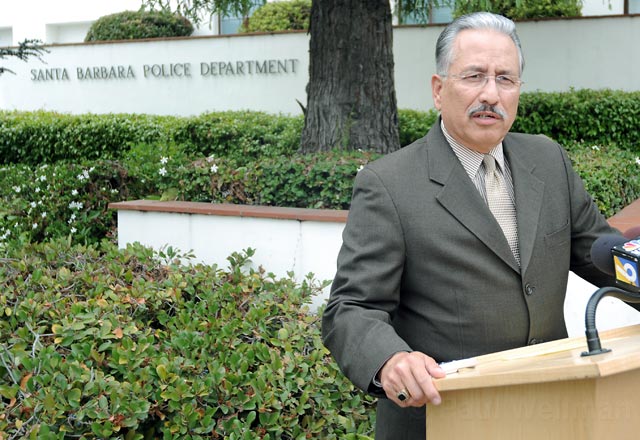
Santa Barbara Police Chief Cam Sanchez has rejected a request to allow motorists stopped for driving without valid driver licenses a 20-minute grace period — during which a legally licensed driver could be found — before impounding the illegally driven vehicles. Sanchez had agreed to look into the experience of cities like San Francisco — which allows the grace period — late last August after meeting with community organizer Belen Seara of PUEBLO, who argued the department’s impound policy imposed a disproportionately heavy burden on the city’s immigrant population.
Undocumented immigrants have been legally prohibited from obtaining a California driver’s license since 1994, and it takes 30 days — and about $2,000 — for unlicensed drivers to get their cars out of hock. Sanchez said he discussed the matter with Sheriff Bill Brown, the other county police chiefs, and a representative of the California Highway Patrol, and they were unified in their insistence on the status quo. “The consensus countywide was that this was not going to be debated,” said Sanchez, “that there would be no change in the county, and that the chiefs were not going to do what San Francisco did.”

Sanchez said he did check with San Francisco Police Chief George Gascón to see what his experience was. “He said he doesn’t know if it works or not. San Francisco is a big city and big county, and they haven’t been able to track it.” Likewise, he said it was too soon to say what effect the grace-period policy adopted by some other California cities has had. Sanchez bristled at the suggestion than anyone in his department engaged in ethnic targeting or racial profiling, as has been alleged by Russell Trenholme, a retired businessman now active with PUEBLO.
Trenholme released a report in August indicating that some police officers were pulling motorists aside with no probable cause and impounding their cars in high volumes. Given the lack of probable cause, Trenholme concluded the motorists were stopped based on ethnicity. “It’s not an issue of racial profiling,” Sanchez replied. “It’s a matter of the law and of road safety.” He cited studies indicating unlicensed drivers were involved in more fatal traffic accidents than licensed ones. “I sympathize with these people. I empathize with them; [the current policy] does create problems for families, but we feel the roads are safer when the law is enforced as it is.”
PUEBLO Executive Director Seara took Sanchez and other law enforcement executives to task, stating, “They are scared to take the decision because of hysteria against immigrants on the national level. It shows a lack of leadership in the police department when it comes to the immigrant community.” Seara charged the chief’s decision will undermine goodwill the department needs with Santa Barbara’s immigrant community to address more serious crime problems, like gang violence. Further, she said Sanchez told her that San Francisco’s Chief Gascón told him the program affirmatively worked. That’s consistent, she said, with what Gascón has told community activists in the Bay Area. Seara noted that the City of Oakland has just enacted a policy allowing motorists stopped for driving without a license to get a licensed driver to drive their car away. Lastly, Seara stressed, police departments enjoy legal discretion in how they enforce state law. People who’ve had their licenses revoked, she said, have to have their cars impounded. But police have greater latitude in dealing with people who’ve had licenses in the past, but no longer have them.
Sanchez denied that politics had anything to do with his decision and dismissed Seara’s argument that the department’s policy would impede the effectiveness of the department’s community-oriented policing. “I’ll tell you what; we’ve solved every gang murder that’s taken place over the past 10 years,” he said. “Every one. The idea that there’s some tit-for-tat — that if we give people a 20-minute grace period we’ll see an increase in cooperation — is just not the case. In any community, some people trust cops, some don’t.”



